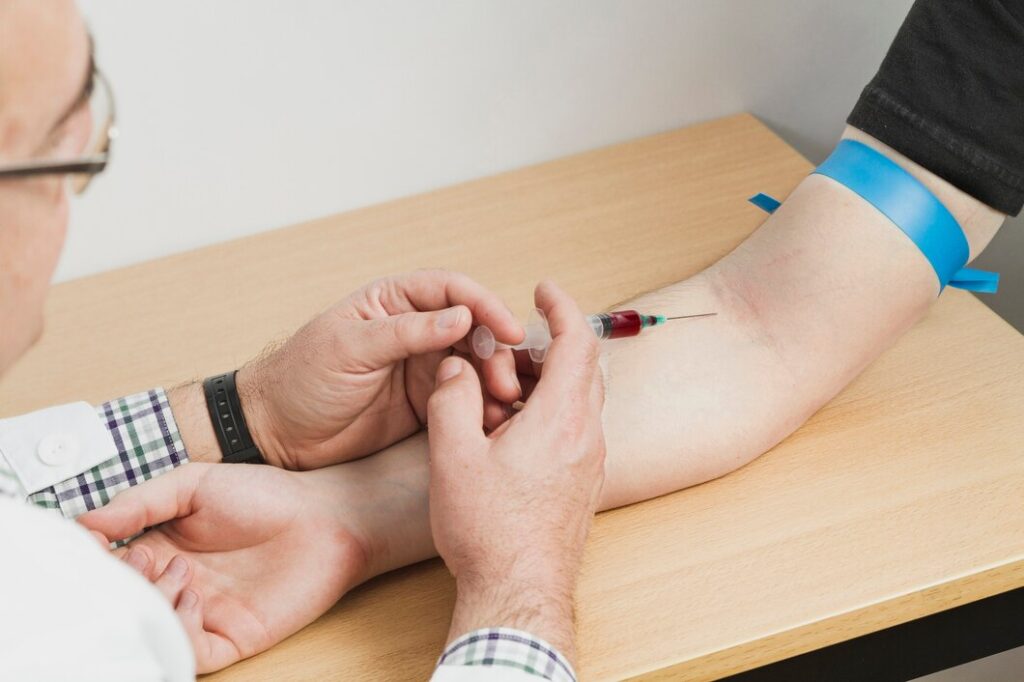Psoriasis and Psoriatic Arthritis in Wilmington - Rheumatology Center of Delaware
We offer the latest quality, state of the art medical care yet in a personable setting. We aim to meld the cutting edge specialist medical care that our clients expect in a comfortable family-oriented atmosphere.
Understanding Psoriasis and Psoriatic Arthritis: Symptoms, Causes, and Treatment Options
Psoriasis and psoriatic arthritis are autoimmune diseases affecting the skin and joints. Psoriasis impacts the skin, while psoriatic arthritis causes joint pain and inflammation. With proper treatment, symptoms can be managed, improving quality of life. This article covers symptoms, causes, and treatment options for psoriatic arthritis.
What is Psoriasis and Psoriatic Arthritis?
Psoriasis is a chronic skin condition that accelerates the growth of skin cells, leading to the formation of red, scaly patches. Psoriatic arthritis, a related condition, occurs when the immune system attacks the joints, causing pain, swelling, and stiffness. In some individuals, psoriasis may develop first, followed by psoriatic arthritis, while others may experience both conditions simultaneously.
The Link Between Psoriasis and Psoriatic Arthritis
Psoriasis and psoriatic arthritis are linked through a shared genetic and immune system connection. Psoriatic arthritis symptoms may develop after the appearance of psoriasis skin lesions. In fact, about 30% of individuals with psoriasis may go on to develop psoriatic arthritis, affecting their joints.
Developing Psoriatic Arthritis: Risk Factors
Certain factors increase the risk of developing psoriatic arthritis, including a family history of psoriasis or other autoimmune diseases. Additionally, genetic markers have been identified that may predispose individuals to developing the condition.
SYMTOMS OF PSORIASIS AND PSORIATIC ARTHRITIS
Joint Pain:
Painful, swollen joints, particularly in the fingers and toes.Skin Lesions:
Red, scaly patches of skin commonly seen in psoriasis.Joint Swelling:
Noticeable inflammation in the joints, leading to stiffness.Fatigue:
Chronic tiredness due to inflammation and pain.Nail Changes:
Pitting, discoloration, or separation of nails from the nail bed.Morning Stiffness:
Stiffness in the joints upon waking up, which can last for hours.Reduced Range of Motion:
Limited flexibility and movement in the affected joints due to pain and swelling.
TREATMENT OPTIONS FOR PSORIASIS AND PSORIATIC ARTHRITIS
Nonsteroidal Anti-inflammatory Drugs (NSAIDs):
For pain and inflammation relief.Disease-modifying Antirheumatic Drugs (DMARDs):
To slow the progression of joint damage.Biologic Therapies:
Targeted treatments to block immune system activity.Corticosteroids:
Reduce inflammation and suppress the immune system, helping to manage flare-ups.Topical Treatments:
Creams or ointments to help reduce skin irritation and inflammation from psoriasis.Physical Therapy:
Helps improve joint flexibility and strength, reducing stiffness and pain.Methotrexate:
A common DMARD that can reduce inflammation and prevent joint damage.
The Importance of Early Diagnosis
Early diagnosis of psoriatic arthritis is crucial to manage symptoms and prevent joint damage. Blood tests, a physical exam, and imaging tests can help confirm the diagnosis and rule out other conditions, such as rheumatoid arthritis.
The Role of Family History in Psoriatic Arthritis
A family history of psoriasis or psoriatic arthritis significantly increases the likelihood of developing the condition. Certain genetic markers can make individuals more susceptible to developing psoriatic arthritis, suggesting a hereditary link.
Joint Protection Strategies
Protecting affected joints is an important aspect of managing psoriatic arthritis. This includes using assistive devices, modifying activities, and avoiding excessive strain on the joints. An occupational therapist can help provide strategies to protect the joints during daily activities.
Reducing Inflammation in Psoriatic Arthritis
Reducing inflammation is essential for managing both skin and joint symptoms of psoriatic arthritis. Medications like NSAIDs and biologics can help control inflammation, while lifestyle changes like exercise and stress management can further reduce inflammation.
OUR MEDICAL CLINIC SERVICES IN WILMINGTON, DELAWARE
WILMINGTON SPECIALIZE IN RHEUMATOLOGY AND INFUSION THERAPY
Our Wilmington facility is committed to providing expert care in rheumatology and infusion therapy. Specializing in the treatment of complex autoimmune and inflammatory conditions, we deliver personalized diagnosis and management to meet your unique healthcare needs. Utilizing state-of-the-art medical technology, our infusion therapy services ensure the safe and effective administration of treatments in a comfortable and professional setting. Trust Wilmington’s dedicated team of specialists to deliver compassionate, high-quality care focused on improving your health and overall well-being.
Rheumatoid Arthritis
Crohn’s
Osteoarthritis
Psoriasis and
Psoriatic Arthritis
Systemic Lupus
Ulcerative colitis
Joint injections
Connective
tissue disease
Osteoporosis
Temporal arteritis
Vasculitis
Generalized
joint pain
Ankylosing Spondylitis
Gout
Fibromyalgia
Polymyalgia
rheumatica
Rheumatoid Arthritis
Crohn’s
Osteoarthritis
Psoriasis and
Psoriatic Arthritis
Systemic Lupus
Ulcerative colitis
Joint injections
Connective
tissue disease
Osteoporosis
Temporal arteritis
Vasculitis
Generalized
joint pain
Ankylosing Spondylitis
Gout
Fibromyalgia
Polymyalgia
rheumatica
Areas Rheumatology Center of Delaware Cares
Wilmington
Wilmington facility is committed to providing expert care in...
Dover
Dover Urgent Care offers prompt medical attention for...
Milford
Milford facility is dedicated to providing specialized care in...
Areas Rheumatology Center of Delaware Cares
Wilmington
Wilmington facility is committed to providing expert care in...
Dover
Dover Urgent Care offers prompt medical attention for...
Wilmington
Milford facility is dedicated to providing specialized care in...
RHEUMATOLOGY CENTER OF DELAWARE FAQs ABOUT PSORIASIS AND PSORIATIC ARTHRITIS
What is psoriasis?
Psoriasis is a chronic autoimmune condition that causes the rapid growth of skin cells, leading to thick, scaly patches on the skin.
What is psoriatic arthritis?
Psoriatic arthritis is an inflammatory arthritis that affects people with psoriasis, causing joint pain, swelling, and stiffness.
How are psoriasis and psoriatic arthritis related?
Psoriatic arthritis often develops in people who have psoriasis. The conditions share an autoimmune component, with both affecting the skin and joints.
What are the symptoms of psoriatic arthritis?
Symptoms include joint pain, swelling, morning stiffness, reduced range of motion, and in some cases, nail changes.
How is psoriasis diagnosed?
Psoriasis is usually diagnosed through a physical exam and sometimes a skin biopsy to confirm the diagnosis.
How is psoriatic arthritis diagnosed?
Psoriatic arthritis is diagnosed through a combination of physical exams, imaging tests (X-rays, MRIs), and blood tests to rule out other conditions.


Role of Blood Tests in Diagnosing Psoriatic Arthritis
Blood tests can help healthcare providers assess inflammation levels and rule out other conditions. While there are no specific tests for psoriatic arthritis, elevated markers of inflammation can suggest the presence of the disease.
Contact Information
- 302-994-2345
- 4512 Kirkwood Hwy Wilmington, DE 19808, USA
Unleash Your Swing at the Historic Ed Oliver Golf Club
Experience the challenge of Ed Oliver Golf Club, a historic public golf course with a rich history and a layout that will test the skills of even the most seasoned golfers. It’s the perfect destination for golf enthusiasts seeking a memorable round.
At the Rheumatology Center in Wilmington, Delaware, specialized care is available for managing Psoriasis and Psoriatic Arthritis. The expert team focuses on reducing inflammation, alleviating pain, and improving skin health with personalized treatment plans tailored to your needs. Whether dealing with skin flare-ups or joint discomfort, the goal is to help you regain control of your health and enjoy a better quality of life. Schedule a consultation today and take the first step toward effectively managing your Psoriasis and Psoriatic Arthritis.







